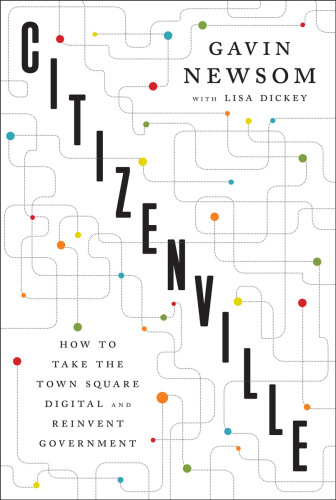
Citizenville
Connecting People and Government in the Digital Age
کتاب های مرتبط
- اطلاعات
- نقد و بررسی
- دیدگاه کاربران
نقد و بررسی

December 24, 2012
Souped-up information technology will set us free, declares this breathless, shallow manifesto. Newsom, the lieutenant governor of California and ex-mayor of San Francisco, heralds the new regime of cloud computing, which makes all public information instantly accessible and, he argues, utterly transforms how governments do business. The specifics he mentions feel small-bore and superficial: city IT departments, he notes, could be outsourced; government databases from Veterans Administration health records to city crime stats can be made downloadable; a New York City phone app guides users to the nearest location where they can get free condoms; and why not have citizens post Yelp-style online reviews of government services? Citing gabby cyberutopian visionaries from Bill Clinton to Mark Zuckerberg, Newsom styles all this as the overthrow of the “top-down, bureaucratic, hierarchical government that’s choking our democracy,” one that empowers citizens to “‘solve their own problems and meet their own needs’” in the manner of open-source programmers and righteous hacktivists. Unfortunately, as with his proposal for a “Citizenville” online game in which people win points for spending their own money on municipal repair projects, his rhetoric amounts to a glitzy but dispiriting brief for the abdication of government responsibilities in an era of budget austerity. Agent: Elyse Cheney, Elyse Cheney Literary Associates.

January 15, 2013
A former mayor of San Francisco introduces methodology to improve citizens' interaction with their government through the Internet. Newsom, the lieutenant governor of California, reflects fondly on his mayoral terms and his efforts to accelerate the learning curve for an often bogged-down city government operating "on the cutting edge--of 1973." As founder of an impressive array of small Bay Area businesses, the author understands the power and influence technology can wield--but how to harness and channel it to engage smart, forward-thinking consumers with their respective bureaucracies? Overcoming governmental "technophobia" is key to bridging that gap, but disinterest, privacy concerns and procurement costs are also roadblocks. Newsom cites many affirmative initiatives on data sharing, governmental transparency and numerous interactive applications like QR codes or his "Citizenville" gaming concept. While conducting research, the author came into contact with a host of technologically savvy professionals, from software pioneers and hyperproductive tech executives to fellow entrepreneurs and even George Clooney, who laments the death of individual privacy. Newsom's pitch for a compulsory donation system to co-fund government projects or the concept of incentivizing to gain more rapid solutions is certainly progressive. An idea to offer $1 billion to the innovator of a cure for a constantly morphing disease like AIDS, however, comes off like a lofty campaign promise. Still, the book remains fresh and lively with Newsom emerging as a persuasive, if fast-talking, progressive proponent focused on how best to "radically rethink the relationship between citizens and government." Empowering, motivating and just a tad self-indulgent.
COPYRIGHT(2013) Kirkus Reviews, ALL RIGHTS RESERVED.

























دیدگاه کاربران